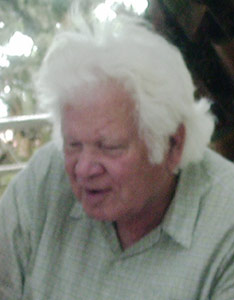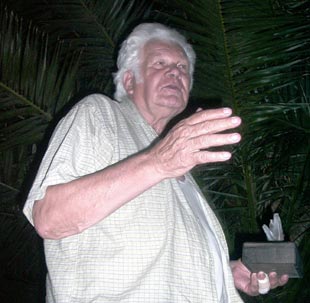BAFA © 2010. All material here is copyrighted. See conditions above. |
Jure Galić
author, Bosnia-Herzegovina
|
Interview with Sonja van Kerkhoff
Translation and interview mediated by Ranko Anđelić Jure Galić was born in 1921 of Croatian descent in Bijaca in Herzegovina and studied Law in Sarajevo after the Second War World. Before the war he was a carpenter and was active in communist activites. During 1939 and 1940 as a member of the anti-fascist resistance Jure Galić started writing short articles which were published in the daily Zabreb newspaper. These articles were a way of raising his voice against the fascist establishment of the time and were critical comments and observations of society around.
Previously he was active in the anti-fascist movement, organising the youth of worker's union and speaking on their behalf.
As a result he spent some weeks in prison in the 1930s and was banned from that city and the surrounding county. So he moved to the Bosnia Herzegovenian city of Ljubuski and wrote articles there. | 
Jure Galić, July 2004.
Photo: Sonja van Kerkhoff.
|
In 1941 when Yugoslavia was occupied by Germans and Italians, he was a soldier in the communist army fighting them and was captured and imprisoned for four months. During this time he kept a journal which was later discovered by the Italians and destroyed. However he tends to remember things visually and after the Second World War published his first book, Nepokoreno Selo (Undefeated Village, 1956) based on his memories of those 4 months of torture along with other comrades as well as his experiences of the resistance.
He was then released, for lack of evidence against him and from that time onwards, kept notes of the events going on around him. Another book of memoirs also published after the Second World War were based on his experiences as a partisan in the mountains of Biokovo (the Croatian Coast) during occupation. This was Pod Nebom Biokova (Under the Biokovo sky, 1959).
|

Jure Galić, July 2004. Photo: Sonja van Kerkhoff.
| During occupation many people in this region supported fascism and Jure Galić wanted to get people to think more about other options and in particular to awaken a social sensibility by posing moral delimma's in his writing. So while his next book, Radi Grumena Zemlje (Because of a handful of soil, 1979) also focused on individuals' actions, the writing was a mixture of narrative and social commentary, and in particular the various characters' struggles on deciding right from wrong. For example, two characters were an elderly couple whose sons were in the Croatian Nationalist Army fighting against the partisans, while the couple themselves helped and fed those, their sons were fighting. |
In this story, the father was anti-fascist from the days of before the war, while his sons were drawn to fascism for material rewards. Here the sons were not supporting fascism for ideological reasons, and it was an awareness of the ideological that Jure Galić was aiming to stimulate in the reader. The book was circulated widely and well received and the edition sold out, as have all his books. A second edition (of 16,000) of Undefeated Village is also sold out.
He has always written creatively because of a desire to narrate.
For most of his life, his main job and income was as a delegate of Bosian and the Yugoslavian parliament. He was also a member of the editorial teams for a number of Yugoslavian Publishing Companies and also President of the Writers Association of Bosnia Herzegovenia, and one of main members of the Yugoslav Writers Association during the 1980s.
Communism here was close to socialism and democracy. It was a Socialist Republic and never a communist state. He said that there was never any censorship of publications and the Writer's Associations, of which Jure was a member of, disagreed with the censorship happening in the neighbouring countries. Some films and books that directly attacked the government were banned but in general there was no censorship of anything of a literary nature.
There were two things that were protected in this country. One was Tito himself and the second was brotherhood and unity. So any book supporting nationalism or dis-unity or racism was banned. Ironically, some of those banned books, promoting nationalism were published after the fall of communism and contributed to the racial tension and resulting war. Jure continued to write about the society around him and his times but he didn't have need for self censorship in his writing because he was not against Tito or the unity of the country.
All of Jure's writing is centred on the factual although his writing is formulated in the form of a novel.
One book, Na rubu beskraja (On the verge of eternity, 1979) concerns a moral account set during the Second World War, where morality was very high. During those days, any stealing was a crime. The novel centers on an officier who stole a sack of potatoes from a farmer to feed his starving unit. Earlier they had shot someone for the same crime. The officier was troubled by this moral delimma, and was also frightened of being found out. In the end he ran away preferring to be shot by the enemy than his own army.
Jure is nationally known as a writer of cultural history of the Herzegovina region and is the only author, until now, who writes about this region. He reads widely in Croatian and has an encyclopaedic mind. There are other authors who write on contemporary life in his country, but not with this emphasis on quasi-biographical drama involving moral decisions, that are characteristic of his writing.
In 1984 he won the highest national prize for a novel, for the book, Prelom (A Break). It is set at the beginning of the Second World War in Herzegovina during a time when there was a bloody war between Croatians, Serbs and Bosnians, not unlike the war of the 90s. A farmer is carrying wood along the road and hears some cries from someone trapped in a pit. After going through the delimma of deciding to help or not, he decides to lay down his load to help the man out. Now the farmer is faced with another delimma, whether to turn the man over to the police in the nearest village or to take him home. He decides to take him home and on the way discovers that he is a Serb. So he hides the man, even from his wife and from his son, a solider in the Croatian Nationalist Army. Eventually his wife questions her husband about the missing food and so he reveals the man to his wife. A final twist in the tale is when the wife discovers that she had slept in the home of the Serb's house. They end up becoming good friends, despite all the various tensions and the ways cross-racial friendship was restricted at that time.
In the 1960's he moved with his wife and two children to Sarajevo. In 2004 he published Sarajevski Dnevnik (Sarajevo Diary, 2004), which is his diary of Sarajevo under siege between 1993 and 1995.
Here is an excerpt:
Thursday, 30th September 1993
This is a time of general disappointment and loss of illusion in which we used to live.
Sometimes bigger or smaller illusions, because the peace in our souls does us good. But when these illusions are lost, our lives become equal to hell.
It was an illusion that war would never happen, but it did. It was an illusion that the war will not last long, and it is still going on. It was an illusion that the people who lived together for so many years would not murder each other, but they are. It was an illusion that there would be no crime against children and the helpless, but it is happening. It was an illusion that whole nations, their culture and material goods, would not be threatened with extinction, but they are. It was an illusion that the international community would not observe us with such indifference, but they do. It was illusion that in each nation there would be stronger and better organised democratic and anti-fascist forces which would oppose this evil, but there aren't. It was an illusion that the world would not let a whole city starve, be thirsty and freezing, but we are. It was an illusion that such a city could not be destroyed and ruined in such a short time, but it is ruined. It was an illusion that in the 20th century you wouldn't be able to hear anything from the outside world for so long, nor even from your own children, but that's exactly what has happened to me.
All illusions are falling one after another, and behind them remains a vast material and spiritual desert. We are being ruined from the inside.
(provisional translation by Ranko Anđelić, page 238)
|

Sarajevski Dnevnik (Sarajevo Diary) by Jure Galić, 2004. Cover Design by Ranko Anđelić
| What was happening seem unbelievable to Jure Galić. He couldn't believe that people would change so dramatically. Even other writers he'd known. Being a prisoner in that city meant that he was extremely dependent. Even getting a candle meant asking someone because you didn't have anything. It was a psychological and physical hell, because you didn't know when it would end or where it was safe. All conversation was reduced to five topics: water, food, electricity, gas and who died, where and how. The parting greeting, take care of yourself, was ironic, because all one could do was try and survive. It was like being trapped inside a prison and in this sense it was much worse than occupation during the Second War World because then, you could leave the city and move.
In 1994 he was able to leave Sarajevo to join his daughter and her family in Munich, Germany through the aid of the P.E.N. He returned to Sarajevo in 1996.
|
He has published 8 books and is currently (2004) working on his next book which is set on the events that led to the Second World War where parallels can be seen in the build up to the recent war in the Balkans. The evil that ignited both wars is the same.
|

Arts Dialogue, Dintel 20, NL 7333 MC, Apeldoorn, The Netherlands
email: bafa@bahai-library.com
|
|


